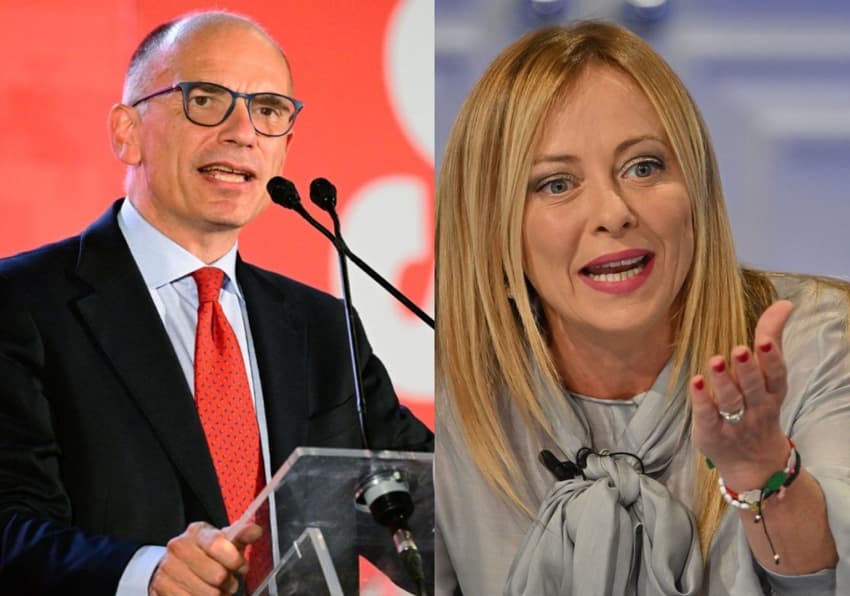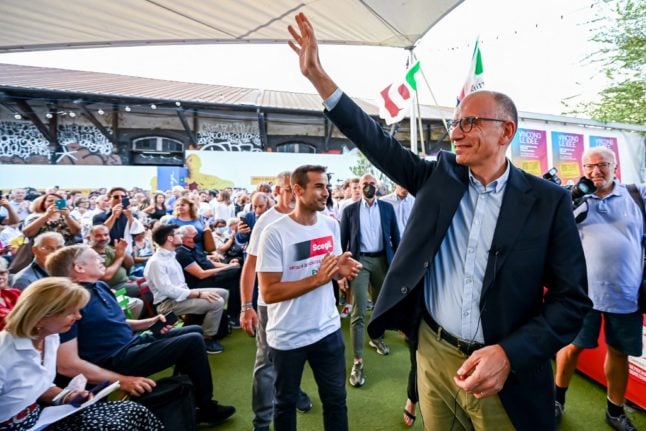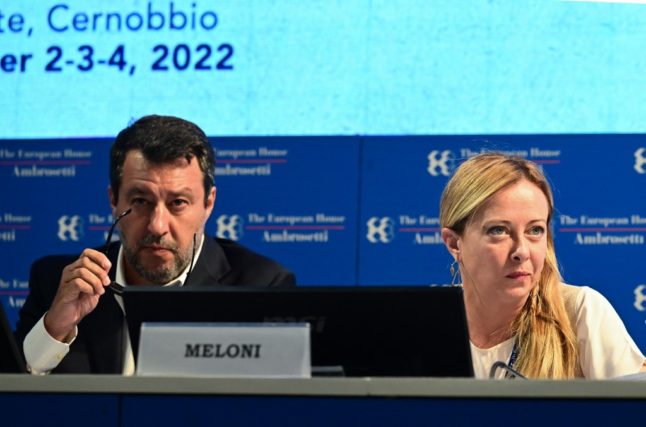Italian elections: Five key points from the Meloni vs Letta debate

Giorgia Meloni clashed with Enrico Letta in Monday night's livestreamed debate - the only one to take place between the two main Italian party leaders before the election. Here are five key takeaways from the debate.
The debate on Monday night between centre-left Democratic Party leader Enrico Letta and hard-right Brothers of Italy head Giorgia Meloni was streamed online by newspaper Corriere della Sera.
It will be the only head-to-head debate between the leaders of Italy’s two biggest parties before the election on Sunday, September 25th.
READ ALSO: Elections will be Italy’s ‘Brexit’ moment, warns PD leader
Italian news reports on Tuesday described how the 90-minute debate was conducted “without any low blows” and was, as Letta put it, "between two people who respect each other”.
Here’s a quick overview of the main takeaways from the debate.
Clash over Europe and the recovery fund
Letta said Italy's election gives voters a choice between such radically different ideas of the country and its place in Europe that it compares to Brexit.
"This is a crossroads, a sort of referendum, a bit like in Great Britain when they had to choose between Brexit and staying in the EU," he said, calling for "more Europe, not less".
While the PD’s centre-left coalition is pro-Europe, all parties in the right-wing alliance are known for nationalist, Eurosceptic views.
“We want an Italy that counts in Europe, not one that protests,” he said.

Enrico Letta, leader of the Italian Democratic Party (PD), campaigning ahead of the upcoming general elections. Photo by Piero Cruciatti / AFP
Meloni however took a softer line in this debate. She stressed that her party had supported EU sanctions against Russia, while suggesting Italy needed to protect its own interests.
Meloni said Brussels "must deal with the big issues" while countries should be able to protect their own interests, describing the EU as "a bureaucratic giant and a political dwarf".
Italy has to “hold its head high” in Europe and in Nato, Meloni said.
Letta also attacked Meloni over the European pandemic recovery funding deal, which he claimed her party wants to “renegotiate”
EXPLAINED: Who’s who in Italy’s general election?
Doing so “will give the impression of Italy being unreliable,” he said, pointing out that the right didn’t vote in favour of the Next Generation EU deal.
“We never voted against, we abstained," Meloni replied.
Both stressed support for Ukraine
Meloni has distanced herself from statements made by coalition partner and League party leader Matteo Salvini recently in which he criticised EU sanctions against Moscow over its invasion of Ukraine.
Apparently referring to these comments, Letta said: “Sanctions are now the only way to stop the Russians.”
He said sanctions “are working, even if they have repercussions for our economy”.
“We are strongly in favour of the Ukrainian resistance. We have always been Atlanticists and Europeanists.”
EXPLAINED: Five ways Italy’s 2022 elections will be different
Meloni responded by saying her party too “had no hesitation in taking sides against the Russian invasion.”
“We supported the government, albeit from the opposition,” she said. "The position of FdI remains the same: an Italy anchored to the West, to the Atlantic alliance, with Europe, in defence of Western values."
But many question whether a hard-right government formed with coalition partners Salvini and Berlusconi, both known for their friendly ties with Moscow, would take a more pro-Russian stance.

League leader Matteo Salvini (L) and Fratelli d'Italia leader Giorgia Meloni are set to form a government together following the election. Photo by MIGUEL MEDINA / AFP
Softened stance on migration?
FdI and its coalition partners are known to take a strongly anti-immigration line, framing refugee and migrant arrivals as a security issue, while PD focuses on human rights and integration.
In this debate Meloni appeared “more cautious than usual on the issue of migration”, noted newspaper Corriere della Sera.
She said Europe should strike a deal with North African governments to keep their citizens at home and open local centres for refugee applications.
“We must prevent the departure of the boats, open the hotspots and evaluate in Africa who has the right to be a refugee. By blocking illegal immigration, legal immigration can be reopened,” she said.
READ ALSO: What are the main parties’ policies for foreigners?
Letta noted that the FdI leader no longer uses the term "naval blockade" - something she has repeatedly called for in posts on social media.
He pointed out that Meloni was also silent on her coalition partner Salvini's preferred tactic of blocking rescued migrants at sea in a bid to put off others.
He said such methods were incompatible with "inspiring to lead a big European country", and said “redistribution” of migrants was needed instead; “which doesn’t happen because of the usual issue of unanimous voting and [Hungarian Prime Minister Viktor] Orbán's opposition.”
Fears over equality and rights
Letta said his rivals posed a threat to immigrants’ rights, to women's rights, and to LGBT rights.
Meloni angrily denied this, accusing him of spreading “fake news”. She said religious identity was fundamental, and spoke out against adoption by same-sex couples - but claimed she had no plans to cut womens’ access to abortion.
READ ALSO: Who is Giorgia Meloni, Italy’s likely next prime minister?
Women who seek abortions needed to be given other options, she said, without specifying what those were.
Same-sex couples should not be allowed to adopt because children "must be ensured the very best, which for me is a father, (and) a mother", she said.
Letta responded by saying what children need is “love”, though he didn’t outline what the centre-left’s policies were on the issue.
Easy victory for the right
Italy’s main newspapers agreed that Meloni had clearly won the debate, just as easily as she’s expected to win the election.
Even the left-leaning Domani newspaper said: "Letta lost, unequivocally. He spent the whole debate, just as in the last few weeks, on fighting an imaginary Giorgia Meloni. The one of past excesses... not the institutional version of today."
The damning verdict underlined how the centre-left has failed to mount a credible opposition to Meloni’s strong right-wing alliance.
The right-wing coalition is expected to take around 46 percent of the vote, according to polls, some 19 points ahead of the centre-left.
Unusually, Letta has already admitted his party’s defeat - though he continues to urge undecided voters to vote for them anyway, or risk handing the right a landslide victory and the absolute majority in parliament that would allow it to change the constitution.
Find all the latest news on Italy’s election race here.
Comments
See Also
The debate on Monday night between centre-left Democratic Party leader Enrico Letta and hard-right Brothers of Italy head Giorgia Meloni was streamed online by newspaper Corriere della Sera.
It will be the only head-to-head debate between the leaders of Italy’s two biggest parties before the election on Sunday, September 25th.
READ ALSO: Elections will be Italy’s ‘Brexit’ moment, warns PD leader
Italian news reports on Tuesday described how the 90-minute debate was conducted “without any low blows” and was, as Letta put it, "between two people who respect each other”.
Here’s a quick overview of the main takeaways from the debate.
Clash over Europe and the recovery fund
Letta said Italy's election gives voters a choice between such radically different ideas of the country and its place in Europe that it compares to Brexit.
"This is a crossroads, a sort of referendum, a bit like in Great Britain when they had to choose between Brexit and staying in the EU," he said, calling for "more Europe, not less".
While the PD’s centre-left coalition is pro-Europe, all parties in the right-wing alliance are known for nationalist, Eurosceptic views.
“We want an Italy that counts in Europe, not one that protests,” he said.

Meloni however took a softer line in this debate. She stressed that her party had supported EU sanctions against Russia, while suggesting Italy needed to protect its own interests.
Meloni said Brussels "must deal with the big issues" while countries should be able to protect their own interests, describing the EU as "a bureaucratic giant and a political dwarf".
Italy has to “hold its head high” in Europe and in Nato, Meloni said.
Letta also attacked Meloni over the European pandemic recovery funding deal, which he claimed her party wants to “renegotiate”
EXPLAINED: Who’s who in Italy’s general election?
Doing so “will give the impression of Italy being unreliable,” he said, pointing out that the right didn’t vote in favour of the Next Generation EU deal.
“We never voted against, we abstained," Meloni replied.
Both stressed support for Ukraine
Meloni has distanced herself from statements made by coalition partner and League party leader Matteo Salvini recently in which he criticised EU sanctions against Moscow over its invasion of Ukraine.
Apparently referring to these comments, Letta said: “Sanctions are now the only way to stop the Russians.”
He said sanctions “are working, even if they have repercussions for our economy”.
“We are strongly in favour of the Ukrainian resistance. We have always been Atlanticists and Europeanists.”
EXPLAINED: Five ways Italy’s 2022 elections will be different
Meloni responded by saying her party too “had no hesitation in taking sides against the Russian invasion.”
“We supported the government, albeit from the opposition,” she said. "The position of FdI remains the same: an Italy anchored to the West, to the Atlantic alliance, with Europe, in defence of Western values."
But many question whether a hard-right government formed with coalition partners Salvini and Berlusconi, both known for their friendly ties with Moscow, would take a more pro-Russian stance.

Softened stance on migration?
FdI and its coalition partners are known to take a strongly anti-immigration line, framing refugee and migrant arrivals as a security issue, while PD focuses on human rights and integration.
In this debate Meloni appeared “more cautious than usual on the issue of migration”, noted newspaper Corriere della Sera.
She said Europe should strike a deal with North African governments to keep their citizens at home and open local centres for refugee applications.
“We must prevent the departure of the boats, open the hotspots and evaluate in Africa who has the right to be a refugee. By blocking illegal immigration, legal immigration can be reopened,” she said.
READ ALSO: What are the main parties’ policies for foreigners?
Letta noted that the FdI leader no longer uses the term "naval blockade" - something she has repeatedly called for in posts on social media.
He pointed out that Meloni was also silent on her coalition partner Salvini's preferred tactic of blocking rescued migrants at sea in a bid to put off others.
He said such methods were incompatible with "inspiring to lead a big European country", and said “redistribution” of migrants was needed instead; “which doesn’t happen because of the usual issue of unanimous voting and [Hungarian Prime Minister Viktor] Orbán's opposition.”
Fears over equality and rights
Letta said his rivals posed a threat to immigrants’ rights, to women's rights, and to LGBT rights.
Meloni angrily denied this, accusing him of spreading “fake news”. She said religious identity was fundamental, and spoke out against adoption by same-sex couples - but claimed she had no plans to cut womens’ access to abortion.
READ ALSO: Who is Giorgia Meloni, Italy’s likely next prime minister?
Women who seek abortions needed to be given other options, she said, without specifying what those were.
Same-sex couples should not be allowed to adopt because children "must be ensured the very best, which for me is a father, (and) a mother", she said.
Letta responded by saying what children need is “love”, though he didn’t outline what the centre-left’s policies were on the issue.
Easy victory for the right
Italy’s main newspapers agreed that Meloni had clearly won the debate, just as easily as she’s expected to win the election.
Even the left-leaning Domani newspaper said: "Letta lost, unequivocally. He spent the whole debate, just as in the last few weeks, on fighting an imaginary Giorgia Meloni. The one of past excesses... not the institutional version of today."
The damning verdict underlined how the centre-left has failed to mount a credible opposition to Meloni’s strong right-wing alliance.
The right-wing coalition is expected to take around 46 percent of the vote, according to polls, some 19 points ahead of the centre-left.
Unusually, Letta has already admitted his party’s defeat - though he continues to urge undecided voters to vote for them anyway, or risk handing the right a landslide victory and the absolute majority in parliament that would allow it to change the constitution.
Find all the latest news on Italy’s election race here.
Join the conversation in our comments section below. Share your own views and experience and if you have a question or suggestion for our journalists then email us at [email protected].
Please keep comments civil, constructive and on topic – and make sure to read our terms of use before getting involved.
Please log in here to leave a comment.